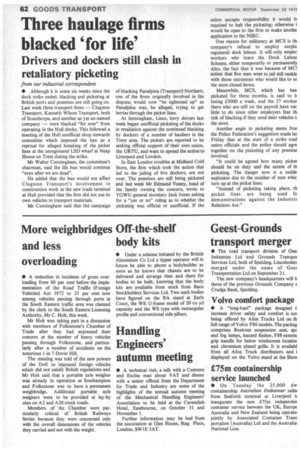Three haulage firms blacked 'for life'
Page 346

If you've noticed an error in this article please click here to report it so we can fix it.
Drivers and dockers still clash in retaliatory picketing
from our industrial correspondent
• Although it is some six weeks since the dock strike ended, blacking and picketing at British ports and premises are still going on. Last week three transport firms — Clugston Transport, Kenneth Wilson Transport, both of Scunthorpe, and another as yet un-named company — were blacked "for ever" from operating in the Hull docks. This followed a meeting of the Hull unofficial shop stewards committee which imposed the ban as a reprisal for alleged breaking of the picket lines at the unregistered LSD wharf at Neap House on Trent during the strike.
Mr Walter Cunningham, the committee's chairman, said the life ban would continue "even after we are dead".
He added that the ban would not affect Clugston Transport's involvement in construction work at the new trade terminal at Hull provided that the firm did not use its own vehicles to transport materials.
Mr Cunningham said that the campaign of blacking Panalpina (Transport) Northern, one of the firms originally involved in the dispute, would now "be tightened up" as Panalpina was, he alleged, trying to get lorries through the picket lines.
At Immingham, Lincs, lorry drivers last week began unofficial picketing of the docks in retaliation against the continued blacking by dockers of a number of hauliers in the Trent area. The pickets are reported to be seeking official support of their own union, the URTU, and want to spread the action to Liverpool and London.
In East London troubles at Midland Cold Store, the firm which took the action that led to the jailing of five dockers, are not over. The premises are still being picketed and last week Mr Edmund Vestey, head of the family owning the concern, wrote to TGWU general secretary Jack Jones asking for a "yes or no" ruling as to whether the picketing was official or unofficial. If the union accepts responsibility it would bl required to halt the picketing; otherwise i would be open to the firm to make anothe application to the NIRC.
One reason for militancy at MCS is till company's refusal to employ surplu registered dock labour. It will only emplo; workers who leave the Dock Labou Scheme, either temporarily or permanently Also, the fact that it was because of MC action that five men went to jail still rankle with those extremists who would like to se the store closed down.
Meanwhile, MCS, which has bee picketed for three months, is said to b losing £3000 a week, and the 27 worker there who are still on the payroll have ver little to do since other employers fear th risk of blacking if they send their vehicles t the store.
Another angle to picketing stems fror the Police Federation's suggestion made lm Friday that at the start of a strike trad union officials and the police should agre together on the picketing of any premise involved.
"It could be agreed how many picket should be on duty and the extent of th picketing. The danger now is a sudde explosion due to the number of men whic turn up at the picket lines.
'"Instead of picketing taking place, th picket lines are being used fo demonstrations against the Industris Relations Act."
































































































































































































































































































































































































































































































































